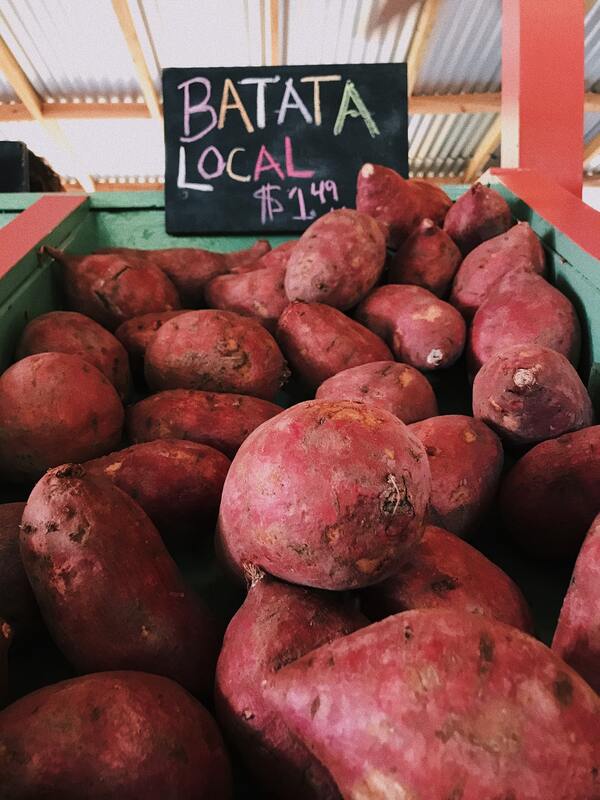|
Sweet potatoes are a delicious, nutritious, and versatile staple for any gardener. A common misconception about sweet potatoes is that they are related to russet potatoes or red potatoes. In fact, sweet potatoes are in the Morning-glory family (Convolvulaceae) and the tuber portion is a true root, like beets and carrots. On the other hand, a russet potato is botanically considered a modified stem and is a member of the nightshade family (Solanacea). Generally grown as an annual vegetable, sweet potatoes are actually an herbaceous perennial. The leaves are edible and may have been used historically for medicinal purposes, including as an antibiotic and a laxative. If you don’t plan to eat the leaves, make sure to add them to your compost pile as they are rich in potassium.
A late frost can ruin your sweet potato crop, so it is important to wait about 3 to 4 weeks after the last frost before planting. Soil temperatures between 60 and 85 degrees Fahrenheit are ideal. Sweet potato root sprouts, also known as “slips,” can be purchased from a local nursery or ordered by mail. It is best to sprout the slips indoors for about 6 weeks in a warm, moist medium before planting them. Bury the sprouted slips in 6-inch holes about 1 foot apart in a part of your garden that receives a full 8 hours of direct sunlight. Avoid planting sweet potatoes near tall plants so that the sunlight is not blocked. Sweet potatoes grow best in rich, well-drained, loamy soil and are fairly drought tolerant. For the best results, be sure to provide about 1 inch of water per week and then stop watering about 2 to 4 weeks before harvest. Adding compost before planting will provide adequate nutrition and increase the soil’s moisture-holding capacity. For annual cultivation, most varieties take between 90 and 150 days of warm weather for the tubers to mature. The leaves tend to turn yellow when the potatoes are ready to harvest, but the crop can be left longer to improve the yield and nutritional content. If your soil is heavy clay, the sweet potatoes can break apart large clods and any forgotten or rotting tubers will provide a natural compost fertilizer. Wait for a dry, sunny day to harvest your sweet potatoes and then gently dig into the soil away from the base of the plant to avoid damaging the skins. Curing your potatoes is essential for long term storage and must be done immediately after harvest. To cure them, place them in an environment with temperatures of 80 to 85°F and 85 to 90 percent relative humidity for 7 to 14 days. To keep humidity high, wrap individual sweet potatoes in perforated plastic bags or newspaper. Cover the sweet potatoes with a plastic sheet or cloth. Curing helps to heal wounds that occur during harvest, prevents shriveling, and reduces the risk of rot during storage. Curing also makes the sweet potato more palatable by converting starches to sugars and improving aroma and texture. For more information regarding growing sweet potatoes, Warren County Soil and Water Conservation District programs, and/or technical assistance with water or soil questions, visit www.warrenswcd.com or call 513-695-1337. Additional Resources: http://extension.msstate.edu/publications/growing-sweet-potatoes-home https://extension.illinois.edu/blogs/good-growing/2020-04-22-how-grow-sweet-potatoes https://www.thespruce.com/how-to-grow-sweet-potatoes-in-the-home-garden-1403479 https://www.goodhousekeeping.com/home/gardening/a20706654/how-to-grow-sweet-potatoes/#:~:text=Sweet%20potatoes%20mature%20in%2090,but%20firmly%2C%20and%20water%20well. https://www.botanical-online.com/en/botany/sweet-potato https://www.youtube.com/watch?v=ueb-Fcuzc4U
0 Comments
Leave a Reply. |
Details
Warren County SWCD Staff BlogA blog to keep you informed on all the latest news at Warren County SWCD and in the conservation world. Archives
May 2024
Categories
All
|
|
|
Contact:PHONE: (513) 695 - 1337
EMAIL: [email protected] HOURS: Monday - Friday 7:30am - 4:00pm (except holidays) Connect:Warren County Soil & Water Conservation District Copyright © 2016
Warren SWCD Privacy Notice. Emails are serviced by Constant Contact. Constant Contact's Privacy Notice. |

